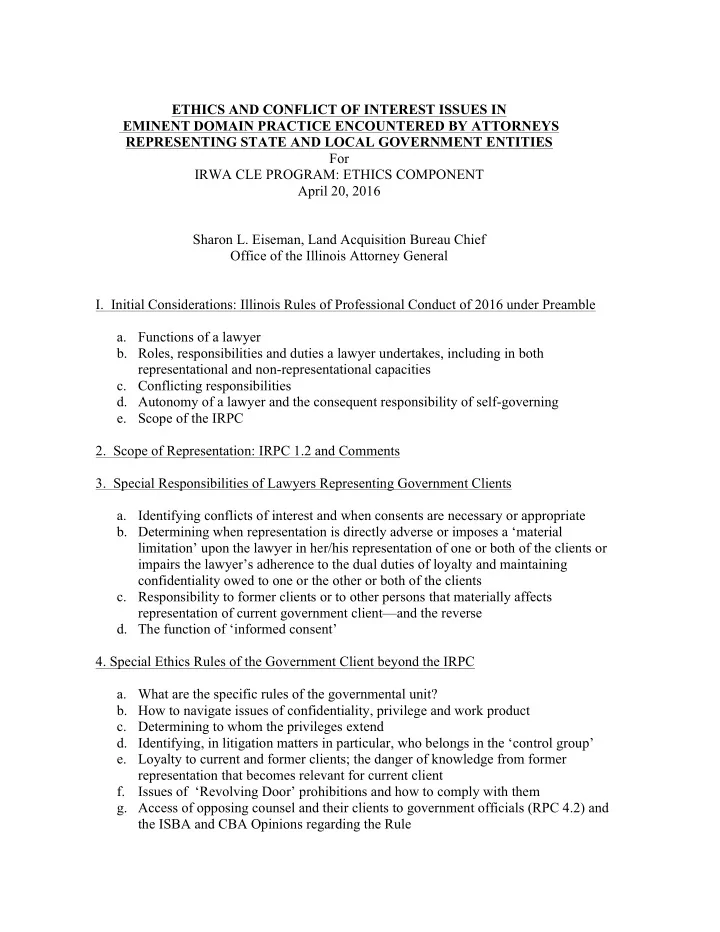

ETHICS AND CONFLICT OF INTEREST ISSUES IN EMINENT DOMAIN PRACTICE ENCOUNTERED BY ATTORNEYS REPRESENTING STATE AND LOCAL GOVERNMENT ENTITIES For IRWA CLE PROGRAM: ETHICS COMPONENT April 20, 2016 Sharon L. Eiseman, Land Acquisition Bureau Chief Office of the Illinois Attorney General I. Initial Considerations: Illinois Rules of Professional Conduct of 2016 under Preamble a. Functions of a lawyer b. Roles, responsibilities and duties a lawyer undertakes, including in both representational and non-representational capacities c. Conflicting responsibilities d. Autonomy of a lawyer and the consequent responsibility of self-governing e. Scope of the IRPC 2. Scope of Representation: IRPC 1.2 and Comments 3. Special Responsibilities of Lawyers Representing Government Clients a. Identifying conflicts of interest and when consents are necessary or appropriate b. Determining when representation is directly adverse or imposes a ‘material limitation’ upon the lawyer in her/his representation of one or both of the clients or impairs the lawyer’s adherence to the dual duties of loyalty and maintaining confidentiality owed to one or the other or both of the clients c. Responsibility to former clients or to other persons that materially affects representation of current government client—and the reverse d. The function of ‘informed consent’ 4. Special Ethics Rules of the Government Client beyond the IRPC a. What are the specific rules of the governmental unit? b. How to navigate issues of confidentiality, privilege and work product c. Determining to whom the privileges extend d. Identifying, in litigation matters in particular, who belongs in the ‘control group’ e. Loyalty to current and former clients; the danger of knowledge from former representation that becomes relevant for current client f. Issues of ‘Revolving Door’ prohibitions and how to comply with them g. Access of opposing counsel and their clients to government officials (RPC 4.2) and the ISBA and CBA Opinions regarding the Rule
SCENARIOS : Three Fact Patterns of potential ‘real life’ situations are presented to illustrate conflicts of interest resembling those an attorney who represents the State in a condemnation proceeding might encounter. CONCLUDING NARRATIVE : As more concrete examples, attorneys in private practice who represent the State, state agencies or local government entities in acquiring property or in bringing claims against owners of contaminated property or in foreclosing on property that is encumbered with state or federal tax liens might be (or might have been) a partner or an associate in a firm that also represents the lenders or creditors who have filed liens against the real estate in which the governmental clients have an interest. In another potential scenario, the firm represents the plaintiff in a foreclosure proceeding against property that is the subject of the litigation or transaction assigned by the government client to that same firm. In this constantly evolving and complex economic climate, it is not so unusual for the same real estate to be the subject of both the government representation and the bankruptcy or foreclosure matter, which means a conflict of interest or the appearance of such a conflict, may exist. If that is the case, then the interests of the various clients must be examined in light of applicable professional responsibility rules, and a decision must be made as to whether such a potential or real conflict can or cannot be waived by the respective clients, including the government entities represented by the appointed attorneys. In accordance with the Rules, for representation to continue for parties with actual or even potential conflicts, the parties must, at the very least, be fully informed of the facts and provide the required consents (often far more stringent for government entities) and the attorneys must remain vigilant as to conflicts that may arise during the pendency of the transaction or the litigation that affect their ability to be objective, diligent and vigorous advocates for the client and the client’s interests. Even closer to home, when an eminent domain case for the Department of Transportation (represented by the Attorney General) is assigned for litigation to a Special Assistant Attorney General whose firm represents the mortgagee on title to the subject property or a creditor in a bankruptcy proceeding filed by the property owner, the situation is ripe for a potential conflict of interest as described in Section 1.7 of the IRPC. The same assumption would hold true where a Special Assistant who represents the IEPA in a complaint against an environmental polluter works in a firm that represents or is asked to represent the owner of the pollution emitting property in the sale of the company. Such conflicts of interest and confidentiality issues arise because the two clients in each scenario: the condemning authority and the lender bank in the first example, and the government regulator and the defendant-owner of the polluting property in the second example, have interests that are likely adverse but they are represented by the same firm, thus creating a ‘material limitation’ that is prohibited by the IRPC. If the decision is close, the creation of a “firewall” can sometimes provide the needed protection but with the condition that, if circumstances change, withdrawal may become necessary. On the other hand, it can be equally acceptable and possibly necessary to conclude that a compromise of the clients’ interests should not be risked, and so you decide 2
to take the ethical ‘high ground’ by terminating or declining one or both of the involved representations. Then both parties deserve a full explanation for the decision so they understand that the circumstances, not their conduct, dictated the choice. . 3
Recommend
More recommend